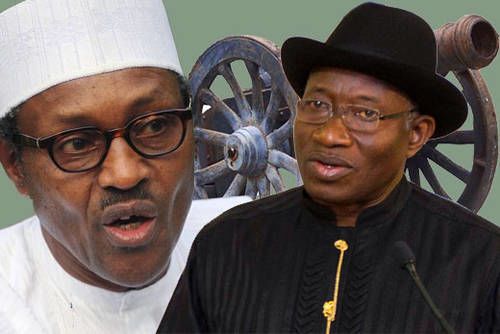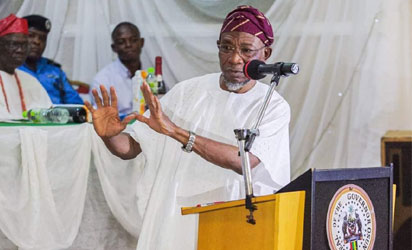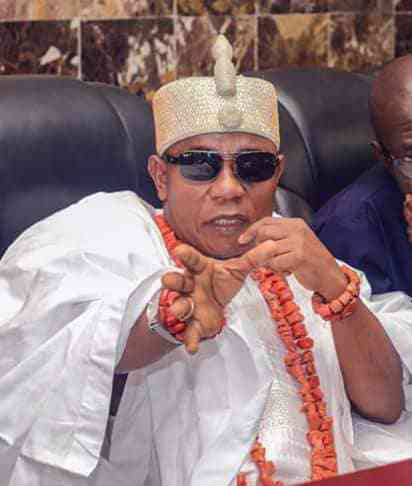Comparing Fuel Subsidy Removal under Jonathan 2012 and under Buhari 2020 is wrong, but General Tajudeen Olanrewaju White Paper on Abisoye NNPC Report will haunt Nigeria until revisited

By BASHIR ADEFAKA

“Before assuming office, President Muhammadu Buhari explicitly stated at campaign foras that the fuel subsidy regime is a fraud which was in tandem with the thinking of mass majority of Nigerians and has been validated by the ongoing prosecution of alledged fuel subsidy fraudsters, hence in the submission of the 2016 budget which was his first national budget to the National Assembly, there was no provision for fuel subsidy payments.”
At a time like this, people whose condition is largely what it is because of their (deliberate or indeliberate) inability to seek truth and examine facts, fall faster in the hands of unpatriotic minded elites who exploit the ignorance in twisting their destiny at every politicking season. It becomes imperative that a dig into the past is done a clear picture of the problem at hand will be available for people to see and then resolve for a lasting solution.
It must however be told that General Emmanuel Abisoye Panel Report on NNPC and General Tajudeen Olanrewaju-led Presidential Review Committee’s White Paper on same Abisiye Report will continue to haunt Nigeria until they are revisited. The problem with Nigeria is that the number of citizens who are in government or politics for collectively national interest is far on the low compared to the number of those who are there for the sole reason of self. The reason they allow successive governments spend hugely on enquiries, researches and white papers in the past but also serve as same people who turn government away from implementing them.
The easy and not too distant example is how Niger Deltans are now clearly the reason tens of trillions of naira pumped into that region since 2001 to make a Dubai out it have been without good result. If report and white paper on NNPC turn around by those two well respected Generals, Abisoye (late) and Olanrewaju (living) are sincerely looked into, there is resemblance of what is being experienced today in them. But, more like, those patriotically executed national assignments can give the Buhari a peep into lasting solution.
Fuel Subsidy Removal, The DEFENDER found out, is still one of the many branches of public life well intended for the good of the people but hijacked by corruption tendencies of the operators.
Excerpts below is lifted from an article titled, “Difference Between 2012 and 2016 Fuel Pump Price Regime” by Nelson Ekujumi published in May 20, 2016, which, according to Alhaji Femi Abbas, a journalism veteran in Nigeria, is still relevant today 2020, to open the eyes of truth seekers to the real issues.
Stated below is the amount expended on fuel subsidy viz-a-viz the national budget by the Federal Government for a ten-year period of 2006–2016:
Year – National Budget – Subsidy Payments
2006 – N1. 9 trillion. – N151. 9 billion
2007 – N2. 3 trillion. – N188 billion
2008 – N2. 45 trillion – N256.3 billion
2009 – N3. 049 trillion – N421. 5 billion
2010 – N4. 6 trillion – N1. 3 trillion
2011 – N4. 9 trillion – N2. 19 trillion
2012 – N4. 7 trillion – N1. 049 trillion
2013 – N4. 98 trillion. – N971 billion
2014 – N4. 69 trillion – N971 billion
2015 – N4. 49 trillion – N trillion +
2016 – N6. 06 trillion. – ———–
From the above table, one can see clearly that the astronomical increase in subsidy payments from N421. 5 billion in 2009 to N1.3 trillion and 2.2 trillion naira in 2010 and 2011 respectively can be noticed from 2010 when ex President Goodluck Jonathan assumed the reins of leadership of the country as acting President.
We need to remind ourselves that in January 2012 when the federal government implemented the removal of fuel subsidy, we could afford it if was transparently managed because our major foreign earner, the crude oil per barrel was selling at above $110 at the international market, the country’s foreign reserve was about $40 billion and there was low or no pipeline vandalism unlike now that the cost of crude oil per barrel has dipped between $40 and $45 or even lower, there is high scale vandalism of oil pipelines which has depleted our income because of a fall in production of crude oil, the foreign reserves was hugely depleted to the tune of about $27 billion by the previous government which went aborrowing to sustain the running cost of the federal government before exiting office as attested to by the then Minister of finance, Dr. Mrs. Ngozi Okonji-Iweala.
The position of the people that the government cannot punish them for its incompetence and criminal complicity in the fuel subsidy fraud, which she was not prepared to investigate and prosecute, was however reinforced by the outcomes of the House of Representatives investigative committee and the Mr. Aigboje Aig Imoukhuede committee which was set up by the federal government as a consequence of the fuel subsidy protests after the irreparable damage to its reputation for aiding and abetting corruption. The report of both committees indicted some persons and companies of fuel subsidy fraud for which they are still standing trial in courts till date.
To correct the misinformation and blackmail of equating the 2012 fuel subsidy situation with the 2016 fuel price regime, we need to make it abundantly clear that the 2012 Occupy Nigeria Protests which witnessed massive turnout of people on their own volition was not a rejection of the removal of fuel subsidy which the people themselves believed was a fraud perpetrated against our commonwealth, but was a rejection of a government that was hands in glove with corruption in violation of the constitution and our values as a people of honour.
Before assuming office, President Muhammadu Buhari explicitly stated at campaign foras that the fuel subsidy regime is a fraud which was in tandem with the thinking of mass majority of Nigerians and has been validated by the ongoing prosecution of alledged fuel subsidy fraudsters, hence in the submission of the 2016 budget which was his first national budget to the National Assembly, there was no provision for fuel subsidy payments.









